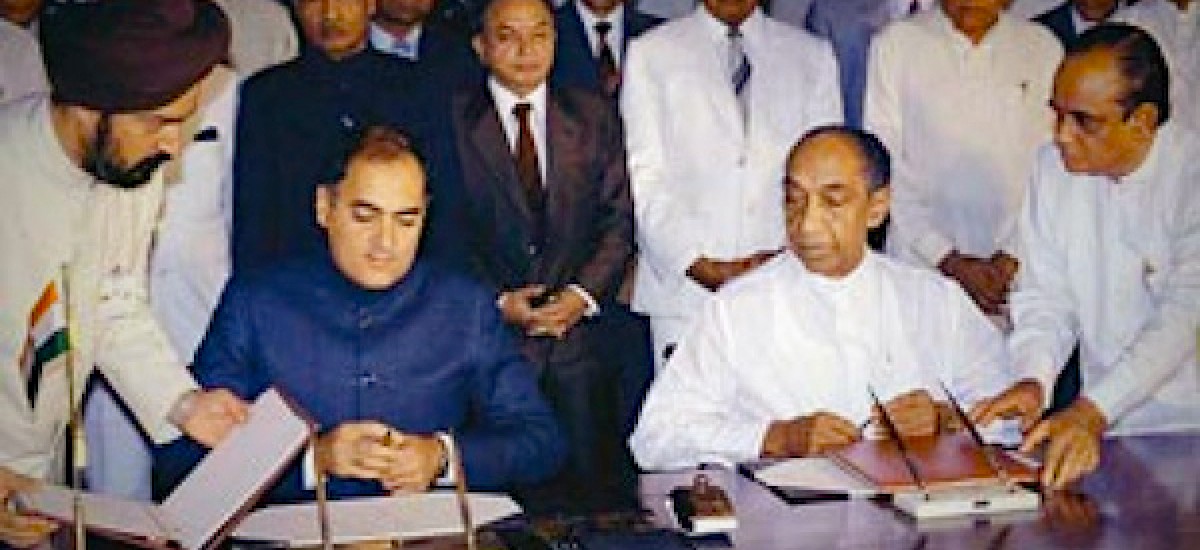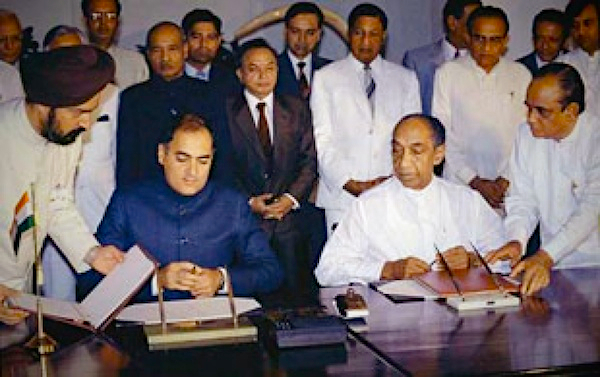For the sixth time over, President Rajapaksa snubbed the Indian Big brother, on devolution and 13th Amendment with a “Plus”. He wasn’t an extra smart lawyer in his Attorney’s life. But he still finds logical space between what he says and what he wouldn’t say, to leave the Indian government on their wrong foot. When Indian External Affairs Minister Krishna says, President Rajapaksa in official conversation with him, promised to offer 13 “Plus” as a solution, President Rajapaksa says, he was only discussing the issue. He has “not” promised. The implied message is, the Indian Minister has got him wrong. Not his fault, hence. Or is it ?
Its no fault of the Indians also, if the Sri Lankan President can not present his own case clear and straight, for the sixth time, in almost three years. Yet its the fault of the Indian authorities, if they can not elicit even on the sixth meeting, what they want from the Head of the SL government or what he wants to give or offer. Why the lines are so blurred, is due to what each wants to avoid offering or avoid asking. President Rajapaksa keeps using his key phrase “home grown solution” for both “13 Plus and Minus” to avoid the issue of devolution. The Delhi leaders pamper “13 Plus” without clearly saying, what they would want as the minimum devolution package, in seeing an end to the Sri Lankan political conflict they have been dragged into, for reasons both geopolitical and South Indian.
So is the dilemma the Tamil National Alliance (TNA) is faced with. They remain the only Northern grounded, democratic political party with a responsibility in finding a truly democratic, sustainable answer to the ethnic conflict that has robbed thousands of innocent lives over many decades and through many generations. They also remain a political party that has to represent a people who have been displaced many times over, have no decent social life yet in their own areas and is controlled by a military that eliminated their only bargaining power, there was. In short, the TNA has no organised social force behind them to agitate and demand, except the Diaspora that can not impact on or influence the Colombo government, direct.
There still remains to the advantage of Rajapaksa, the emptiness in political Opposition, both North and South. Tamil politics is divided. Its awfully divided here as well as in the Diaspora. Its divided to the extent that one extreme would not want to leave the sectarian and wasteful politics of the LTTE and the other to make deals with the most corrupt of all Sinhala regimes since independence. There is no alternative, a pragmatic alternative that would back the TNA in pushing this regime to find a decent and a viable democratic answer to the legitimate political aspirations of the Tamil people, within a “Single” Country, on a single Constitution.
Its the international pressure that Rajapaksa has to mind himself about, over the ethnic issue. His advantage also is that, the international community, those who command authority over the UN and its agencies and Western forums, do not take him to be a Milosevic, or Sri Lanka, a Sudan. The US has been funding this regime all through the war and they continue to fund it, despite accusations on war crimes and crimes against humanity. So has the EU, though GSP “Plus” was deliberated upon for over two years, before it was suspended. Not for the Tamil Diaspora to claim success, but Trade Unions in the EU to demand workplace decency and “rights”. GSP “Plus” campaign was a trade union campaign in the EU and it remains so, in the US to date. Despite demands for accountability, the major international players continue to sustain this Rajapaksa regime, politically and financially.
This needs a turn around in taking stock of who pushed whom for what and achieved what. This shows that Rajapaksa is still capitalising on the absence of social protest and pressure mobilised in our own society. In the absence of political leadership that can not be substituted by the elite NGO sector, especially in the Sinhala society, there is a serious absence of people driven demands asking for socio political answers. Its a Sinhala society that Rajapaksa keeps saying is not easy to bring to terms with power devolution, simply because no political leadership has worked in creating an alternate social purpose, a discourse, in leading social thinking. An unfortunate lack of intellectual political leadership, to be clear and plain.
Within this scenario, India is a reluctant traveller in search of an answer, as proxy for the SL Tamil polity. Proxies don’t play politics with the same desire, aspiration and on the same agenda, as the affected people who are compelled to find an answer for their own purpose of living. Rajapaksa therefore can afford to keep India waiting, projecting Sinhala opposition and his government’s need to keep “all communities satisfied”, another that wouldn’t happen, unless done . Thus his exit always with the promise of a “home grown answer satisfying all communities”.
What the TNA keep missing out on, is this “exit slogan” of Rajapaksa in a situation where the international community can not also be expected to bring results and can not be pushed for results. Yet there can not be a political problem that has no answer. There are no political answers possible, without a social demand. Often the answer needs a strong social demand, in the face of reluctant “rulers”. This is reason why the All Party Representative Committee (APRC) Report doesn’t see the light of day. But that is also the most recent effort in finding a reasonably justifiable answer to the protracted political conflict.
The APRC is one that the President brought together in search of his desired “home grown solution” to the “national question” way back in July 2006. The APRC was supported by an “Experts Committee”, also appointed by the President. The whole process took in 128 sittings for the APRC to finalise its proposal as a durable solution, as noted in this “column” a fortnight ago. What is more important with the APRC is that, after much deliberation it presented in August, 2007, a basis for a new Constitution that had 21 Chapters, upon which a new Constitution could be drafted. Mind you, this political consensus was achieved, despite the war was being fought with a very narrow, Sinhala Buddhist social mindset.
Based on its draft proposal, in June 2010, and that was over 01 year after the war was concluded, the APRC came out with a political consensus through deliberations between the extreme Sinhala, the moderate Sinhala, the “Left of Centre” and Right wing politics, in offering a format for a new Constitution with a reformed State structure that accommodates devolved power. Again, their Final Report handed over to the President, goes beyond the 13th Amendment, though it does not discuss the issues of devolution, in restricting itself to the 13th Amendment. They also propose a fairly well argued Second Chamber, one that is definitely better than what the President now hints as the “Plus” in his “13 Plus” idea. His idea of a “Senate”.
Here is political consensus that represents all the communities, including President Rajapaksa’s Sinhala Buddhist sentiments that now only needs the signature of the UNP and the TNA. The UNP that played safe and cautious by avoiding the APRC will not be able to go against such broad political consensus. What with the JHU, the MEP and the SLFP also consenting, with the EPDP, the SLMC and the CWC endorsing it.
The APRC Final Report thus stands as the best and the only consensual political draft that can oppose and negate the Rajapaksa ploy in wanting a “Parliamentary Select Committee” (PSC) to discuss the same issues, these political parties debated and discussed for 04 full years. Why should not the APRC Final Report be presented in parliament, instead ? It is as important as the LLRC, being a presidential committee. This is where the TNA is not forceful in its politics against the Rajapaksa regime. There is no purpose in the TNA also resorting to technical and legal arguments in opposing the PSC, which of course is a waste of time and energy. Yet the importance is in countering the Rajapaksa move with a political move that offers and option, by demanding that President Rajapaksa present the Final Report of his own APRC, instead. The TNA should lobby support here among other political parties and trade unions, in Delhi, among the international community and in the Diaspora demanding that Rajapaksa presents the APRC Final Report in parliament, for final consensus instead of a time wasting PSC.
The APRC Final Report carries almost all what the Rajapaksa says, he wants included in a durable solution. A home grown solution, all round acceptance and also his “Senate” as a second chamber. Why the same Rajapaksa who appointed the APRC is now troubled over that can be politically understood. But why is the TNA hesitating over that ?
They need not react to Rajapaksa and they need to get out of their dependency on Delhi and international players. Instead have those external players dependent on them as the only unarmed, independent, democratic Tamil political party on the ground. They’ve got to be seen and politically felt in the North and in the East, and speaking to the Sinhala South. To date they have allowed for a singular Northern lobby, taking the East for granted, allowing the Rajapaksas to capitalise the East. The TNA too have to have both feet on the ground here and play politics in Sri Lanka, first. That is what awaits an opening for a solution, in providing the Tamil people the dignity of life, as equals in a decent society.


